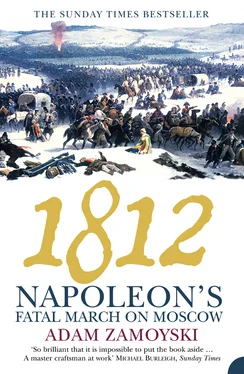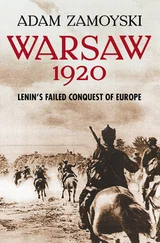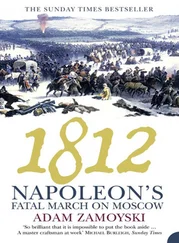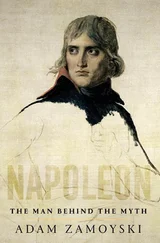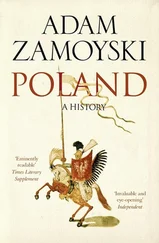Much of the revolutionary ardour that had fired the French armies of the 1790s and early 1800s had been quenched by 1812. ‘As the uniforms grew more embroidered and gathered decorations the hearts they covered grew less generous,’ as one observer put it. Napoleon himself sensed a lack of enthusiasm for the forthcoming campaign. ‘People have always followed him with excitement; he is surprised that they are not prepared to end their careers with the same dash with which they embarked on them,’ noted his secretary Baron Fain. 24But it was he who had turned his commanders into what they were.
‘From the moment that Napoleon came to power, military mores changed rapidly, the union of hearts disappeared along with poverty and the taste for material well-being and the comforts of life crept into our camps, which filled up with unnecessary mouths and with numerous carriages,’ in the words of General Berthézène. ‘Forgetting the fortunate experiences of his immortal campaigns in Italy, of the immense superiority gained by habituation to privation and contempt for superfluity, the Emperor believed it to be to his advantage to encourage this corruption.’ 25He gave his marshals and his generals titles, lands and pensions on the civil list. He demanded of them that they keep palaces in Paris in which they were to entertain at the appropriate level. As members of his court, they must maintain a glittering entourage, as he increasingly did himself. This high living softened them up, and they became less and less willing to give up their warm beds and fine palaces in fashionable parts of Paris, not to mention their wives and mistresses, for the rigours of the bivouac and the uncertainties of war. This was particularly true of the marshals.
‘They were most of them between the ages of thirty-five and forty-five when, after a stormy youth, a man begins to look for a settled domesticity,’ wrote von Funck. ‘They could hardly expect to win a higher degree of fame, but might well jeopardise the reputations they had made.’ A good example was Napoleon’s chief of staff Marshal Berthier, Prince de Neuchâtel, a plump man of settled tastes in his mid-fifties with a magnificent apanage and an adored and adoring mistress in Paris. 26
At the same time the lavish rewards given to those who distinguished themselves in battle were an irresistible incentive to soldiers and officers right up to the rank of general, who all saw in war the possibility of making their fortune. A simple soldier might obtain promotion, which would give him a higher salary and status, or the Légion d’Honneur, which meant pension rights. A general might obtain the coveted marshal’s baton, which signified fame and fortune, and a ducal title to boot.
There was also the opportunity of making some money on the side through the more or less legitimate acquisition of precious items. Looting as such was not countenanced, but in the course of campaigns in distant lands it was possible to purchase things at knockdown prices and bring them home without paying any duties. Valuables found on the field of battle or in the enemy camp were fair game, as was anything that might be left masterless through the fortunes of war. As this great campaign to end all campaigns was being prepared, a good many felt that it would be their last opportunity to get rich.
There were also a great many for whom war furnished the prospect of adventure, the opportunity to distinguish themselves or a last chance to share in the glory. ‘At last I was going to find myself at some of those battles which are destined to change the course of history; I was going to fight under the eyes of so many of the illustrious warriors who filled the world with their renown, Murat, Ney, Davout, Prince Eugène, and so many others, and under the eyes of the greatest of them all, under the eyes of Napoleon!’ remembered a Creole from Saint-Domingue. ‘There I would have my chance to distinguish myself, there I would be able to obtain decorations and promotion of which I would be proud and which I could hold up to the world! Before a year was out I would be chef de bataillon ; I would be colonel by the end of the campaign, and after that …’ 27
Most of Napoleon’s entourage, beginning with Caulaincourt and including close friends and collaborators such as General Duroc, repeatedly beseeched him not to go down the road of war. Many of them warned that Russia could not be defeated in conventional ways. Napoleon had read the accounts of Charles XII’s disastrous foray into Russia almost exactly a hundred years before, beginning with the famous one by Voltaire, who wrote that ‘there is no ruler who, in reading the life of Charles XII, should not be cured of the folly of conquest’. Napoleon dismissed such arguments with annoyance. ‘His capitals are as accessible as any others, and when I have the capitals, I hold everything,’ he snapped at one of his diplomats who had been pointing out the perils of going to war with Alexander. But he had a habit of making statements he did not believe in, as though he were trying to convince himself by convincing others. And the special nature of the forthcoming campaign was not lost on him. ‘If people think that I am going to make war in the old way, they are very much mistaken,’ he is alleged to have declared. 28
He certainly prepared himself for the forthcoming campaign as he had prepared for no other. For one thing, realising that he would be operating in detached corps at some distance from each other, he decided to make an example of General Dupont, whose capitulation at Bailén had been such a humiliation. Before setting off for Russia, Napoleon had him retried and given a harsher sentence. 29
He had officers who spoke German and Polish or Russian attached to every unit, while others were made to take Russian lessons so they could interrogate prisoners and gather intelligence, and he set up a network of intelligence agents fanning out from Poland into Russia’s western provinces. He ordered his librarian to supply him with books on the Russian army, and on the topography of Lithuania and Russia, which he studied, paying particular attention to roads, rivers, bogs and forests. As early as April 1811 he commissioned the Dépot de la Guerre to engrave a series of large-scale maps of western Russia. 30
Not the least daunting aspect of this campaign was that the enemy frontier, on the river Niemen, lay about 1500 kilometres from Paris. Thus a length of time and a huge effort were required to move up men and supplies before the campaign could begin. And the Russian capital cities of St Petersburg and Moscow lay another 650 and 950 kilometres respectively beyond that. An army marching from Paris to Moscow without fighting would take up to six months to cover the distance. To make matters worse, the last three hundred of the 1500 kilometres up to the Niemen lay through poor, infertile areas of Prussia and Poland, while the first five hundred of the next 950 kilometres were in even less abundant country. It was, moreover, criss-crossed by rivers, mottled with bogs and forests, and contained large areas of wilderness.
Napoleon’s tactic had always been to move fast, concentrate large numbers of men at the right point before the enemy knew what was happening, knock out their army with a decisive blow and force them to make peace on his terms. But he would have to work hard to achieve it in this theatre of operations.
His armies had in the past been able to move fast because they travelled light, a tradition originally forged of necessity. The French revolutionary armies of the 1790s had been hurriedly improvised and had not possessed a proper commissariat. Since they regarded enemy territory as belonging to tyrants and enemies of the revolution, they lived by looting. With time, they began to buy what they needed, but as they paid with largely worthless paper assignats , it amounted to the same thing. Napoleon disapproved of looting, and brought in administrators who would provide for the army’s needs in a more methodical way. They bought what was needed, paying in real money or receipts that were generally honoured, when peace had been signed, by the government of the defeated country. But the fact remained that French armies lived off the fat of the land they moved through. And as they moved fast, they did not stay long enough to exhaust its resources.
Читать дальше
